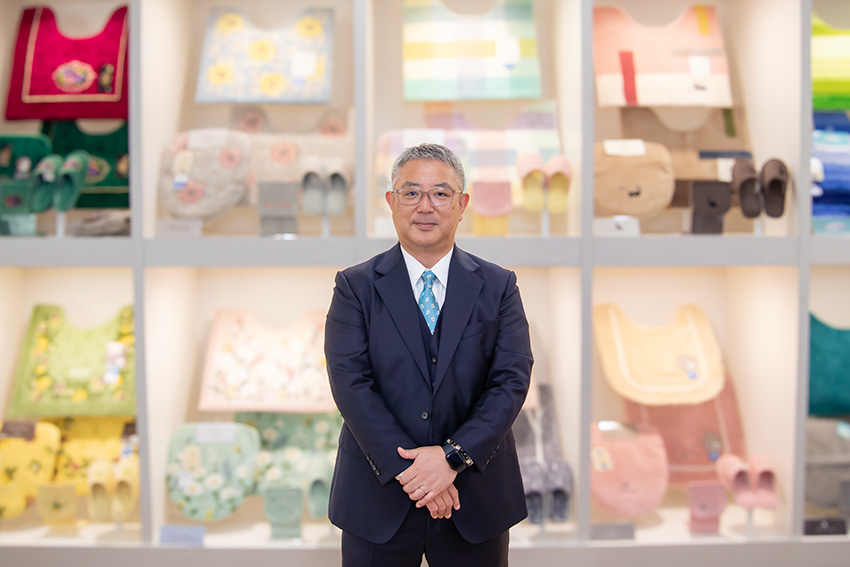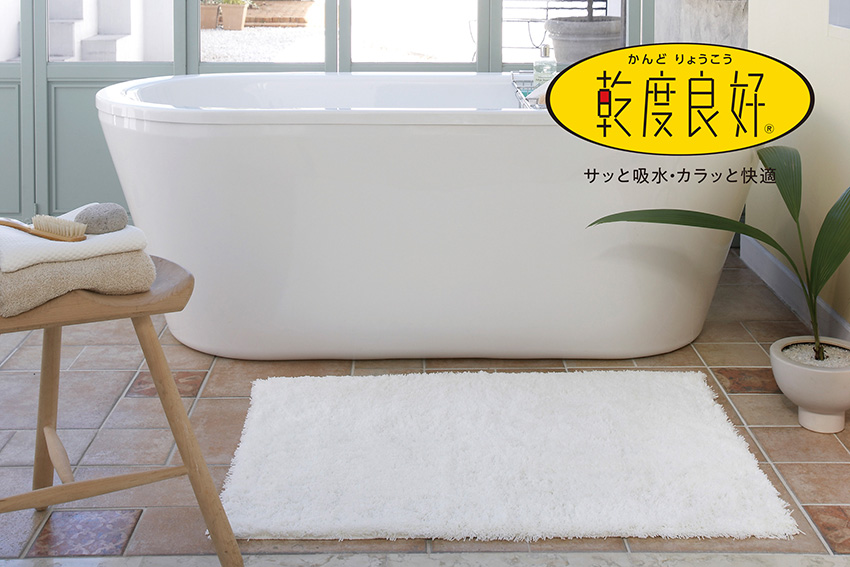From hemp rope to household essentials, Oka’s deep-rooted commitment to craftsmanship continues to shape its approach to quality, sustainability, and international growth. President Oka reflects on the company’s evolving strategies, product innovations, and aspirations in an ever-changing market landscape.

Traditionally, the Japanese manufacturing spirit of monozukuri revolves around a deep commitment to achieving product perfection through exceptional circumstances. This philosophy extends beyond creating a product, embodying the art and pride that is invested in every step of the process. As a specialist manufacturer of bathroom and kitchen mats, what does monozukuri mean to you and your company?
My grandfather established this company, and the initial product sold was hemp rope. Customers would call my grandfather Taka-san, and they preferred to purchase Taka-san’s rope because it was more durable and easy to use. This monozukuri of my grandfather has been passed down to the company we have today. We are always mindful of providing holistic products that are durable and easy to use. We feel that we must always be considerate of the users. Purchases should not be one-offs, and we are aiming for repeated purchases by the same customers. To do so, the product needs to be attractive, and customers will want to purchase it again and again. Putting efforts into providing customers with quality products is important to our business model. I would even say that monozukuri is the soul of our company.
Over the next 15 years, Japan anticipates significant demographic shifts, which are characterized by both an aging and declining population. This will lead to both a shrinking domestic market and a labor shortage. What challenges and opportunities does this create for your company?
With this in mind, we have been actively pursuing new types of businesses. Although the population is declining, the number of households is not drastically declining, which is good for our household goods. Despite this, we still feel it is important to diversify our offerings. We see opportunities in pet goods as well as nursing care, and in terms of B2B, there are opportunities with hot springs and Japanese-style hotels. One key approach is finding new sales channels for our existing products, and to that end, We have our own manufacturing plant in Shanghai. We have our own manufacturing plant in Shanghai. This factory is not only for the Japanese market but also for the Chinese market. The United States and Europe are leaders in household products, but at the same time, Asian markets such as Southeast Asia are emerging and are very attractive to us. Through our factory in China, we hope to cover the entire Asian region.

Are there any specific countries you are targeting for your international expansion?
Southeast Asian countries such as Vietnam, Indonesia, and Thailand.
The Chinese market is known to be very competitive. How do you set apart your products from the competition?
One of the differences between our company and others is our monozukuri spirit.
There is an attention to detail that other companies do not have. There are many companies that mention superficial features, but that is not a true differentiator.
We would never do something like this. Monozukuri is the heart and soul of our company, and this is the thread that connects us to our customers. In order to be a trustworthy company, we have to be honest and straightforward.
Oka is not a large company, but we want to be an integral part of the lives of people who value factors such as the well-being of their families and care for the environment.
The housing sector is rapidly evolving with new designs and technological advancements. Can you give us any insight into your development process and how you stay ahead of the rapid changes in your sector?
Because our business was focused on wholesale, we had limited opportunities to hear directly from consumers. To address this, we opened a store in Jiyugaoka, Tokyo in 2018 to have direct contact with our customers.
In addition, our sales team visits supermarkets and department stores to conduct sales
demonstrations. During face-to-face demonstrations, we always ask customers if they have any problems using bath mats. Many of them said that they do not want to wash bath mats together with clothes when washing them. On the other hand, it was found that many people do not mind washing a towel-type bathmat together with clothing.
I want to machine wash and use the dryer, but conventional bath mats are not suitable for the dryer due to their non-slip coating.
Therefore, we developed a towel-like mat made of the same material as the kandoryoko® bath mat, which is highly absorbent and quickdrying, and created the CARARACA® bath mat, a product that can be washed in a washing machine with clothes and towels and can also be used in a dryer.
Is this technology patented?
We have a monopoly agreement with yarn makers.
Out of all of your bathroom products, which do you think will be the most successful in international markets?
The "CARARACA®" bath mat introduced earlier is a product that we aim to expand overseas. It can be washed in a washing machine and can also be used in a dryer. In the U.S. market, a combination of washing machine and dryer is the mainstream. I myself like this product and would like to sell it in overseas markets.
Since taking on the mantle of president in 2007, you’ve made a really strong effort to increase commercial-based sales. In terms of your business now, what percentage of your total sales are commercial-based ones?
Currently, approximately 20% of our sales are B2C. This is direct sales to customers, and the remainder is B2B commerce, including wholesale.
Another of your brands is PLYS, which offers a wide range of products for the kitchen and bathroom. You also have a variety of other diversified brands and products. How do PLYS products offer clever new ways of designing a kitchen, bathroom, or living room?
We provide a wide range of products and brands that support the lifestyles of people. The company’s mission is to provide products that help people lead fulfilling lives. Those who enjoy their lives are often busy and not just dormant at home. We want to provide functionality and enjoyment through the usage of our products. Our Veggie Maji series, for example, targets to reduce food loss by providing containers and ziplock packaging, all of which are designed to allow food to last longer. This would help a family with working parents reduce the number of times they have to go shopping.
We exhibit our products in Shanghai, Thailand, and Vietnam several times a year. The Japanese governmental agency for exporting SMEs is helping us, and in November 2024, we will be exhibiting our products in Shanghai, China.
Have you received positive feedback from your exhibitions in Shanghai in the past?
Pet goods were well received. In Thailand, on the other hand, we exhibited household goods, but there was not much response. We heard that Thai people do not spend much money on bath products, but rather on pets and children.
Partnerships are a critical strategy for SMEs such as yours, and we saw that you partnered with Sanrio and Disney for licensed products. Are you looking to expand your overseas partner network, and if so, where are you most interested in building new partnerships?
We hope to find an American or European dealer who could be trustworthy and handle our products. We are looking for mutual trust in both business methods and selling methods.
In 2015, the United Nations adopted the 2030 Agenda for Sustainable Development with the aim of addressing global socioeconomic challenges, promoting environmental sustainability, and guiding the world to a prosperous future. Furthermore, the UN has set long-term goals of achieving carbon neutrality by 2050, a commitment in which Japan actively participates. What initiatives have you introduced to reduce your environmental impact and ultimately contribute to a more sustainable future?
Honestly speaking, we have not made any moves towards carbon neutrality. However, we do have many SDG activities. We use recycled materials and reusable materials for our product manufacturing. We also make donations to a non-profit called WaterAid.
From the founding spirit of our grandfather's generation, we have been very focused on manufacturing products that are durable and long-lasting, not disposable. We believe that is what is important for a sustainable society.
Imagine that we come back on the very last day of your presidency and interview you all over again. What goals or dreams do you hope to achieve by the time we come back for that new interview?
Many Japanese companies talk about the “lost 30 years,” but the last few years have also been a period of deflation in Japan. Now, with the weakening of the yen, the cycle has reversed and inflation is on the rise. Now is the time to increase their presence in the domestic market and protect their companies. It has been difficult to make drastic moves in the past, but now that the economy is at a turning point, it is important to become a company that consumers, not just retailers, can rely on directly. I want our employees to be proud of Oka as a company.
0 COMMENTS